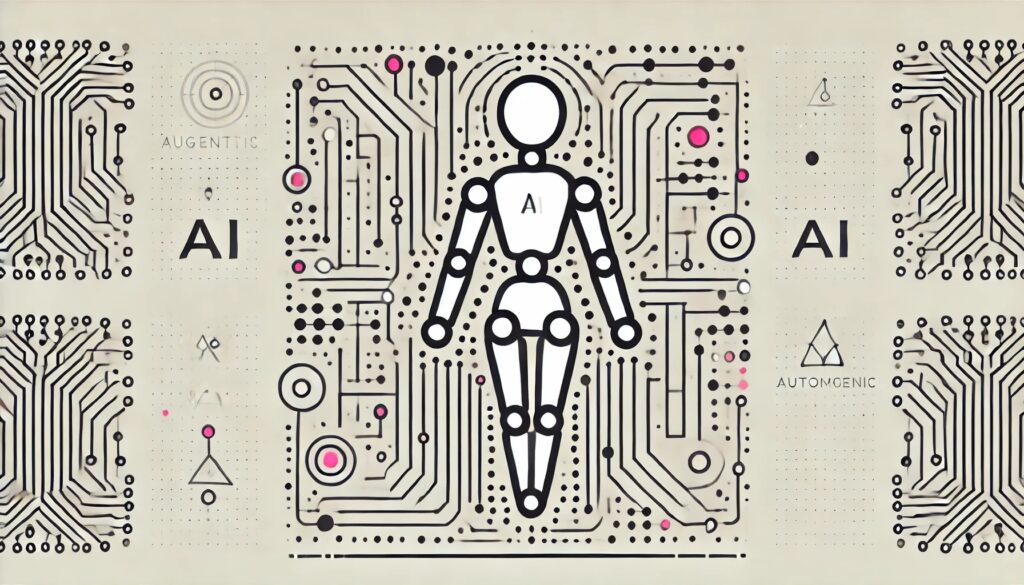
Understanding the Future of Autonomous Intelligence
In the ever-evolving landscape of artificial intelligence (AI), new concepts and technologies continually emerge, reshaping our understanding and expectations. One such concept gaining traction is Agentic AI. But what exactly is Agentic AI, and how does it differ from other forms of AI?
Defining Agentic AI
Agentic AI refers to artificial intelligence systems that possess agency. This means they can act independently, make decisions, and pursue goals without constant human intervention. These systems perform tasks autonomously, adapting to new information and changing environments.
Key Characteristics
- Autonomy: Agentic AI systems operate without direct human control, making decisions based on their programming and learned experiences.
- Adaptability: These systems adjust their actions based on new data, allowing them to function effectively in dynamic settings.
- Goal-Oriented: Agentic AI aims to achieve specific objectives, often optimizing its behavior to meet these goals efficiently.
How It Works
At the core of Agentic AI are advanced algorithms and machine learning techniques. These systems train on vast amounts of data, enabling them to recognize patterns, learn from experiences, and make informed decisions. The decision-making process involves evaluating potential actions, predicting outcomes, and selecting the best course of action.
Applications of Agentic AI
Agentic AI is transforming various industries by enhancing efficiency and enabling new capabilities. Some notable applications include:
- Healthcare: Autonomous systems monitor patient health, provide personalized treatment recommendations, and even perform surgeries. For example, the da Vinci Surgical System allows surgeons to perform complex procedures with enhanced precision and control, using AI to assist in real-time decisions.
- Finance: AI agents analyze market trends, execute trades, and manage investment portfolios with minimal human oversight. Robo-advisors like Betterment and Wealthfront use AI to create and manage investment strategies tailored to individual clients, optimizing returns based on market conditions.
- Transportation: Self-driving cars and drones navigate complex environments and make real-time decisions. Companies like Waymo and Tesla lead in developing autonomous vehicles that promise to revolutionize how we travel.
- Retail: Agentic AI is also making waves in the retail sector. Amazon Go stores use AI-powered sensors and cameras to allow customers to shop without traditional checkouts, creating a seamless shopping experience.
The Components
What exactly makes these AI systems so powerful? Let’s break down the core components that drive their functionality.
Perception and Sensing: The Eyes and Ears of AI
At the heart of Agentic AI is its perception and sensing capability. These systems are equipped with advanced sensors and data collection tools, allowing them to perceive their environment in real-time. Just as humans rely on their senses to navigate the world, agentic AI uses its sensory data to understand what’s happening around it.
This sensory data might come from cameras, microphones, lidar systems, or even biological sensors in more complex environments. The ability to perceive the environment accurately is crucial for these systems to function effectively.
Cognitive Processing: The Brain of the Operation
Once the AI has gathered data through its perception and sensing capabilities, the next step is cognitive processing. This is where the magic happens. Agentic AI utilizes sophisticated algorithms to analyze and interpret the information it receives.
This cognitive processing allows the AI to not just understand its environment but also to make decisions based on that understanding. Whether it’s navigating through a cluttered space or engaging in a conversation, cognitive processing ensures that the AI’s actions are informed and purposeful.
Learning and Adaptation: Growing Smarter with Time
One of the most fascinating aspects of Agentic AI is its ability to learn and adapt over time. Unlike traditional AI systems that require constant human intervention for updates and improvements, agentic AI can evolve on its own. This learning process can occur through several methods:
- Reinforcement Learning: Here, the AI learns from the consequences of its actions, receiving rewards for successful behaviors and penalties for mistakes.
- Supervised Learning: The AI is trained using a large dataset where the correct outcomes are known, allowing it to learn from examples.
- Unsupervised Learning: The AI identifies patterns and relationships in data without needing labeled datasets, enabling it to discover new insights autonomously.
This ability to learn and adapt makes Agentic AI highly versatile, capable of thriving in new or changing environments.
Benefits of Agentic AI
The rise of Agentic AI brings numerous benefits, including:
- Increased Efficiency: By automating routine tasks, businesses can focus on more strategic activities. For instance, AI-powered chatbots like IBM Watson handle common inquiries, freeing up human agents for more complex issues.
- Enhanced Accuracy: AI systems process information and execute tasks with high precision, reducing the risk of human error. In medicine, AI algorithms help radiologists accurately identify anomalies in medical images, leading to earlier and more accurate diagnoses.
- Scalability: Agentic AI handles large-scale operations, adapting to growing demands without the need for proportional increases in human resources. For example, AI-driven logistics platforms like Ocado optimize warehouse operations, ensuring efficient order fulfillment even during peak periods.
The potential of Agentic AI to transform industries and daily life is immense, providing new levels of efficiency and innovation— Tech Innovations Weekly
Challenges and Considerations
Despite its promise, Agentic AI presents challenges that must be addressed:
- Ethical Concerns: The autonomy of Agentic AI raises questions about accountability and the potential for misuse. The use of AI in surveillance, such as facial recognition systems deployed by law enforcement, has sparked debates about privacy and civil liberties.
- Security Risks: Ensuring the safety and integrity of these systems is critical, as they could be targets for cyberattacks. Autonomous vehicles, for example, must be protected from hacking attempts that could compromise passenger safety.
- Regulatory Issues: Policymakers must develop frameworks to govern the deployment and use of Agentic AI responsibly. The European Union’s AI Act is one such effort aimed at creating comprehensive regulations to ensure the ethical use of AI technologies.
Real-World Case Studies
To better understand the impact and potential of Agentic AI, let’s explore some real-world case studies:
Case Study 1: Waymo – Transforming Transportation
Waymo, a subsidiary of Alphabet Inc., leads in developing autonomous driving technology. Waymo’s self-driving cars navigate complex urban environments, making real-time decisions to ensure passenger safety and efficient transportation. Through extensive testing and deployment, Waymo has demonstrated that Agentic AI significantly reduces accidents caused by human error and provides accessible transportation options for people who cannot drive.
Case Study 2: IBM Watson – Revolutionizing Healthcare
IBM Watson is an AI platform that has made significant strides in healthcare. By analyzing vast amounts of medical data, Watson provides doctors with evidence-based treatment recommendations. In oncology, Watson helps oncologists by suggesting personalized cancer treatment plans based on the latest research and patient-specific factors. This application of Agentic AI has improved diagnostic accuracy and treatment outcomes, showcasing its potential to enhance healthcare delivery.
Case Study 3: Ocado – Optimizing Retail Logistics
Ocado, a British online supermarket, uses Agentic AI to optimize its warehouse operations. The Ocado Smart Platform employs AI-driven robots to pick and pack groceries efficiently. These robots navigate warehouse grids autonomously, ensuring that orders are fulfilled quickly and accurately. By leveraging Agentic AI, Ocado has streamlined its supply chain, reduced operational costs, and enhanced customer satisfaction.
Case Study 4: Amazon Go – Redefining Retail Experience
Amazon Go stores use AI-powered sensors and cameras to create a checkout-free shopping experience. Customers enter the store, pick up items, and leave without waiting in line to pay. The AI system tracks the items taken and automatically charges the customer’s Amazon account. This innovative use of Agentic AI has revolutionized the retail experience, making shopping more convenient and efficient.
A Fututure Outlook
As technology advances, the capabilities of Agentic AI will continue to grow. Future developments may include:
- Enhanced Learning: More sophisticated machine learning techniques will enable AI systems to learn faster and more effectively. This could lead to advancements in fields like natural language processing, where AI systems will better understand and interact with human language.
- Better Integration: Agentic AI will become more seamlessly integrated into various aspects of daily life, from smart homes to advanced industrial processes. Smart assistants like Amazon’s Alexa and Google Assistant are early examples of this trend.
- Greater Collaboration: Human-AI collaboration will improve, with AI agents acting as intelligent assistants, enhancing human productivity and decision-making. In the workplace, tools like Microsoft’s Cortana help manage schedules, set reminders, and streamline tasks.
FAQs
Q: What is the difference between Agentic AI and regular AI?
A: Agentic AI refers to AI systems that possess agency, meaning they can act independently and make decisions without constant human intervention. Regular AI might still require human oversight or direct control.
Q: How does Agentic AI learn and adapt?
A: Agentic AI uses advanced algorithms and machine learning techniques to learn from vast amounts of data. It adapts by recognizing patterns and adjusting its actions based on new information.
Q: What industries benefit the most from Agentic AI?
A: Industries such as healthcare, finance, transportation, and retail see significant benefits from Agentic AI. These sectors leverage AI for tasks like patient monitoring, investment management, autonomous driving, and creating seamless shopping experiences.
Q: Are there ethical concerns associated with Agentic AI?
A: Yes, the autonomy of Agentic AI raises ethical concerns, including accountability, privacy, and the potential for misuse. It’s crucial to address these issues through proper regulation and ethical guidelines.
Q: Can Agentic AI replace human jobs?
A: While Agentic AI can automate certain tasks, it also creates opportunities for new roles that involve overseeing, maintaining, and improving AI systems. The focus should be on augmenting human capabilities rather than outright replacement.
Q: How secure is Agentic AI?
A: Security is a major consideration for Agentic AI systems, especially those that control critical infrastructure or personal data. Developers must implement robust security measures to protect these systems from cyber threats.
Q: What future advancements can we expect in Agentic AI?
A: Future advancements may include more sophisticated learning techniques, better integration into daily life, and improved collaboration between humans and AI. This could lead to smarter, more efficient systems that enhance our daily experiences.
Conclusion
Agentic AI represents a significant leap forward in the field of artificial intelligence, offering the promise of autonomous, adaptable, and goal-oriented systems. While the journey towards fully realizing the potential of Agentic AI is still underway, its impact is already being felt across multiple sectors. As we navigate the opportunities and challenges it presents, understanding and embracing this technology will be crucial for shaping a future where humans and AI work together harmoniously.
Sources
- IEEE Spectrum: AI – An online magazine with regularly updated articles on the latest advancements in AI, including agentic systems.





